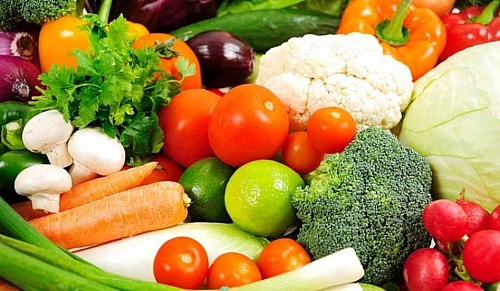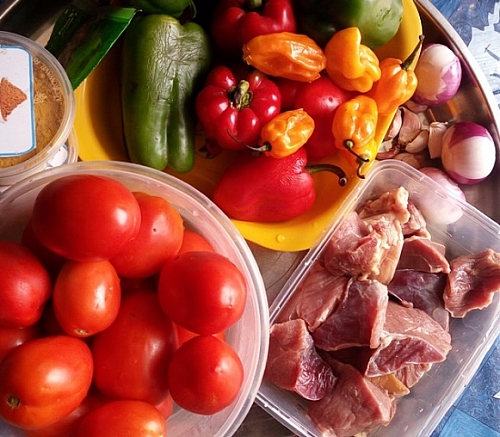Food is an important substance for human existence, it has a lot to do with an individual health, physical, social and intellectual existence, without food man cannot survive on planet earth. Foods contain essential nutrients and are basically grouped into six classes which include: carbohydrates, proteins, fats and oils (macronutrients), vitamins, minerals and water (micronutrients). Each of these classes of food is as important as the other, and they are all essential nutrients that the body needs for daily survival. Three out of the six classes of food (carbohydrates, proteins and fats) are needed for energy supply, while the remaining three (mineral, vitamin and water) helps the body to make use of the other three in a proper way, however, the six classes of food are further brought into one umbrella known as Nutrition.
Table of Contents
What is nutrition?
Nutrition is an important aspect of eating; it is defined as the interaction of nutrient in the body through the processes of consumption, absorption, assimilation, digestion and excretion. A good nutrition is the main key to good health, this could mean eating variety of foods within the six classes of food and being mindful of the nutrients and the healthfulness you derive from such foods.
Poor nutrition could lead to poor health, poor productivity, poor growth and development of body parts; on the other hand, a good nutrition affects the well-being of an individual- physically, socially, intellectually and mentally. The amount of foods and the content of foods we eat can affect our growth and what we eat can easily reflect on the outside-which means we are what we eat.
Food and nutrition are becoming more of a science and many researcher are working hard daily to find out how nutrients interact in the body and which food can be eaten- to enhance growth and development, to get rid of ugly weight, to boost energy and vitality, to slow down aging process, to help keep the immune system in good state, to maintain radiant skin. They are also finding out what other foods to be eaten to slow down cancer, heart diseases, and other health related diseases.
Good nutrition
Only one type of food would not be able to provide the body with the required nutrients for growth, support and health; except in the case of breast milk for babies (breast feeding), but combining different foods from different food groups would help carry out these function. However, a good nutrition is the ability to eat balanced diets at the right quantity combined with physical exercise for proper development and function in the body. A good nutrition is needed by both adults and kids and this can only be gotten from a wide range of foods such as- vegetables, fruits, whole grains, legumes, meat, nuts, dairy products and water and by eating clean foods (also see some of the foods you need to avoid here).
A poor nutrition on the other hand can cause a lot disease such as: anaemia, scurvy, obesity, blindness, kwashiorkor, cardiovascular diseases, diabetes, marasmus, cretinism especially in acute cases. Poor nutrition during pregnancy can also lead to poor child development which may result in stillbirth, preterm birth and it can also cause stunt or retarded growth in kids.
Types of Nutrition
There are basically six types of nutrition which are:
- Carbohydrate- Carbohydrates are macronutrients and they are one important food groups which are made up of sugar, starch and glucose and cellulose or fibre and are found in fruits, vegetables, wheat, cereals, whole grains and in dairy products. Carbohydrates consist of carbon, oxygen and hydrogen at the chemical level. There are two types of carbohydrates (simple and complex carbohydrates) and they have so many functions in the body such as- provide energy for the muscle, fuel for the central nervous system, help the brain to function properly by improving memory and also prevent protein from being used in the body as an energy source and they also enable fat metabolism.
- Proteins– proteins are other macronutrients that are needed by the cells; they are present in the body in form of enzymes, antibodies, messengers, structural components, transport. Proteins are need for repair and regulation of organs and tissues of the body, proteins bind and carry atoms and small molecules within cells and throughout the body. Proteins are also needed for building of the body structures and they are gotten from cheese, meat, milk, egg, beans, lentils, nuts, seeds. Protein consist of amino acids- the building block of protein. Amino acids synthesize proteins and other essential compounds in the body such as creatine, peptide, hormones and some neurotransmitters and there are 20 different types of amino acids that can be combined together to make protein.
- Fat and oil– Fat is the third macronutrient which is also known as triglyceride, the term oils refer to the unsaturated fats which are liquid at room temperature. Fats are grouped into four parts, saturated, Trans, monounsaturated and polyunsaturated fats. Fats are gotten from meat, vegetable oil and milk, butter, walnuts, pastries etc. These fats play important role in the human body as they help to maintain hair and skin and are also use for the production and absorption of some vitamins and hormones.
- Minerals– Minerals are of two kinds, macro minerals and trace minerals, these are essential substances found in foods and they are needed for many functions, these mineral include: calcium, phosphorus, magnesium, sodium, potassium, and chloride as the macro minerals and the trace minerals include: iron, copper, iodine, zinc, fluoride, and selenium and are needed in small amounts by the body. Minerals are needed for bones and teeth formation, for bone and muscle supports, they help to transport oxygen in the red blood cells to other tissues in the body and help carry out other vital functions.
- Vitamins There are 13 vitamins in food substances and all of these have different functions. These vitamins include: Vitamin A, B complex, C, D, E, K, in the body among others. Vitamins help in the formation of red blood cells, help in fast healing of wounds, provide protection from osteomalacia (softening of bones in adults) and helps keep the immune system in good health. Foods like beans, vegetables fruits milk and meat contain vitamins.
- Water Water is a very vital substance in human body as it aids in metabolic activities and prevent dehydration. The amount of water needed by the body to carry out its functions should depend on ones age, weight, height and environmental temperature. The specific amount of water the body needs on a daily basis should also be measured with the type of activities performed (physical exercise and heavy activities), the type of food eaten should also be linked to the quantity water that an individual should take for instance, someone who eats salty foods tends to drink more water than the person who doesnt. Water is absorbed into the body through foods and drinks. The major function of water in the body is to transport minerals and other nutrients from one cell to another and make them available to the body. Water also supports the kidneys and the livers by helping them to remove waste products from the body; water regulates the body temperature and helps hydrolysis reaction to take place.
Importance of nutrition
- Our body needs a complete nutrition to function well, which without this completes nutrition; the body will be left to suffer from dangerous diseases attacks.
- A good nutrition provides the body with the required energy for work and also helps to build healthy bones and muscle for supports.
- Foods that contain protein are usually broken down in the body in form of amino acids. These amino acids are then used to build and repair any muscle tissue. This is very important for those who are physically active or that exercise regularly.
- Vitamins found in nutritious foods help in wound healing, keep the eyes teeth, gum and, skin healthy, while also protecting from the body from infections.
- Nutrition helps fight against infection and help the body to recover from after sickness
- A good nutrition helps the body to develop and repair cells and tissues.
- By eating a complete nutrition, the body automatically absorbs the required nutrients needed for growth, development and energy and distribute to other cells.
- A combination of fruits, vegetables, lean proteins and whole grains can help one lose, maintain or control weight. Replace high-fat and high-calorie foods with nutrient rich items.
- The fibre in fruits, vegetables and whole grains helps to keep one fuller for longer, while proteins provide one with cellular support.
Nutrition information/facts
Nutrition information or facts are often seen written on one corner of some common food packages, cans and wraps we eat on a daily basis; however, it will be wise to-
- Think about what you take into your body.
- Read this information first to know what amount to use or reduce.
- Regularly view the nutrient profiles for these common foods before consumption.
- Adjust the portion sizes of those foods before consuming them.
- Include familiar portion sizes if they are insufficient.
- Create your own food menu.
- If you need more help on nutritional guide patterning your health issue, meet with your Doctor and talk more on that.

